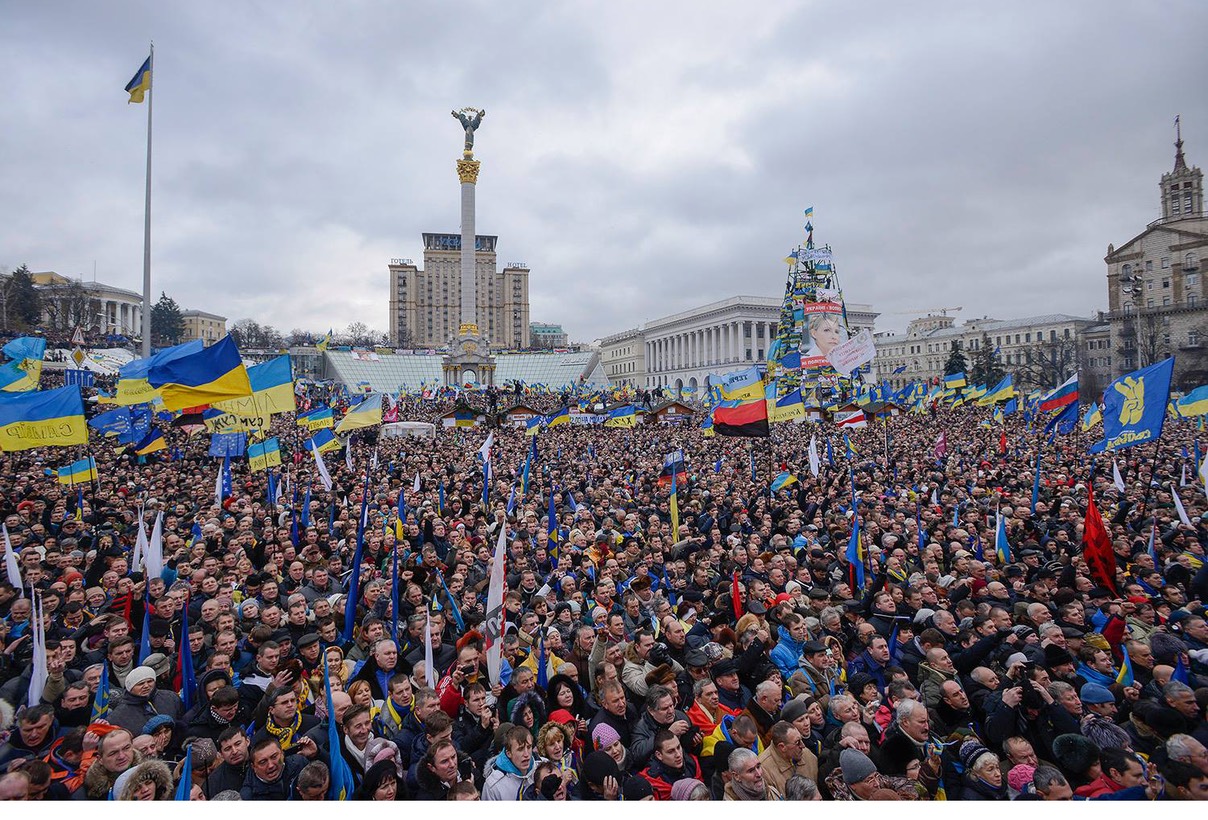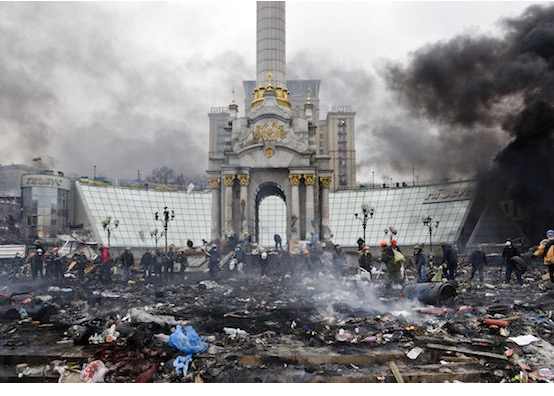THE EUROMAIDAN 'REVOLUTION'
The break with Dugin occurred in 2014 when, in the context of the Euromaidan 'revolution' (as she sees it), Semenyaka appeared as Press Secretary for the Right Sector. She describes what happened in a podcast discussion with Dugin made for Countercurrents, the website of the American White Nationalist, Greg Johnson:
'I can fully agree with the portrait of the overthrown president Victor Yanukovych as described by Alexander Dugin in the preceding Guide to Kulchur podcast: just like all the other presidents of “independent” Ukraine, he was not particularly pro-Russian, he simply served those who paid the most. It was him who initiated the EU association agreement. Under his rule was held the first secret gay pride parade, which was protected by the special riot police “Berkut” (disbanded after the revolution). However, he repressed Ukrainian nationalists (among others, Yanukovych imprisoned the leader of the future National Corps movement Andriy Biletsky, as well as fabricated the case against the members of his organisation, The Patriot of Ukraine, who were detained for plotting the explosion of the monument to Lenin) (16) and suppressed Ukrainian small and medium business. Yet, when Putin forced Yanukovych to freeze the EU association negotiations (after all, not so beneficial for Ukraine even purely economically) and start integration into the Eurasian Customs Union, we did not pay any attention to the protests of the middle class which considered the EU an economic paradise.
(16) Three members of Patriot of Ukraine were accused of attempting to blow up the statue of Lenin but according to [Vyacheslav Likhachev and Hanna Hrytsenko]: Reporting Radicalism dossier on the National Corps, https://reportingradicalism.org/en/dossiers/groups/national-corps-political-party: 'On December 21, 2011, Biletskyi was arrested for his alleged involvement in an assassination attempt. On August 23, 2011, a fight involving weapons occurred at the Patriot of Ukraine office in Kharkiv. The dispute emerged over ideology and left Serhii Kolesnyk, who himself wielded a less-lethal “traumatic” pistol during the fight, with stab wounds and a head injury. Although Biletskyi was not involved in the fight itself, the official investigation asserted that he had incited members of the organization to kill Kolesnyk and promised to help resolve any proceeding issues with law enforcement agencies.'
Reporting Radicalism is an initiative aiming to provide 'high-quality reporting and analysis on the groups and individuals who pose a serious threat to democratic development and pluralism in Ukraine.' It is 'implemented and managed by Freedom House … a US-based non-governmental organization' which gives 'promoting U.S. Leadership' as one of its main purposes: https://freedomhouse.org/issues
'But, when the students were violently beaten by Berkut, Ukrainian patriots perceived it as a chance to transform the peaceful pro-EU protests into the anti-governmental national revolution, and succeeded in it. When the phase of violent clashes between the police and hired thugs, on the one side, and nationalists, on the other, began in the streets, the liberal pro-EU opposition played zero political role. One could say that it was a backup for the nationalists who were throwing molotovs at the police and were capturing administrative buildings, but, on the other hand, by “supporting” the protesters, the West tried to hijack the revolution and, in fact, has always disapproved of the national-revolutionary methods. So the rivalry between the “Euromaidan” and the national-revolutionary Maidan is obvious enough to understand what side is worthy of and requires your support, especially if you wish to weaken the other side.
'As a result, the overthrow of the regime was successful, however, the national revolution is far from complete. Just like the socialist revolution, which failed in 1905 and succeeded only in 1917, the Ukrainian national revolution might take decades. Right Sector, as a broad national-revolutionary movement, failed to produce a new political class that would be ready to take power after the fall of Yanukovych’s regime; consequently, the power vacuum was filled by liberals, oligarchs from the previous political era like Petro Poroshenko and even rebranded members of Yanukovych’s Party of Regions.
'This drawback is currently being corrected by the National Corps / Azov Movement as the fastest developing nationalist movement in Ukraine: it has a parliamentary wing, the National Corps party which is represented in every region of Ukraine and counts in its ranks over 10,000 activists, a paramilitary structure, National Militia, often described by the globalist media as the modern “SA,” over 30 social and cultural projects as independent NGOs which allow National Corps to practice entryism in all social fields, and, last but not least, the military wing unseen since the times of WW2: the Azov Regiment of the National Guard of Ukraine (subordinate to the Ministry of Internal Affairs), the only volunteer battalion that was expanded to the level of the regiment and the most combat-ready unit of the entire Ukrainian armed forces. A special attention is paid to the educational programs: military ones aimed at the modernisation of the Ukrainian army, political ones preparing the future political leaders and metapolitical structures closely cooperating with the international department; the clash between the liberal and the nationalist flank will continue on a larger scale as we are striving for power and are ready to implement different scenarios.' (17)
(17) Olena Semenyaka: Maidan Revolution: Nationalists vs. “Euromaidan”, accessible at https://interregnum-intermarium.tumblr.com/post/183139437749/national-corps-attended-etnofutur-iii-conference It seems to be part of a conference report delivered to the 'Etnofutur III conference' in Tallinn, hosted by the youth organisation of Estonian People’s Conservative Party (EKRE), Blue Awakening (Sinine Äratus), 23rd February 2019. The following quotes all come from this same very informative website.

The maidan protest

Aftermath of the Maidan protest
Semenyaka is insistent that the Azov movement is not anti-Russian:
'At the same time, the cultural difference between Eastern and Western Ukraine is much exaggerated. I say it as a bilingual person and a member of the Azov Movement which was born in the Eastern Ukrainian industrial city of Kharkiv and is dominated by mostly Russian speaking activists from Eastern Ukraine. Moreover, there are many ethnic Russians in the ranks of our movement. Furthermore, even my parents have a kind of cultural nostalgia for Soviet times and would never believe that the war with Russia is possible, but they would never enter the streets to oppose the Ukrainian government and soldiers either … The biggest Eastern Ukrainian cities (Kharkiv, Odessa, Mariupol) remained Ukrainian precisely thanks to the efforts of Ukrainian nationalists and ultras who expelled relatively small groups of “professional separatists.” That’s why we never use the expressions like “the civil war in Ukraine.” Activists of our movement from Donetsk and Luhansk observed the developments since the very beginning and could tell the difference between the local newborn “separatists” who did not know how to handle weapons and single out the political enemies and silent Russian military who supervised them.'
I quote that not because I agree with it but simply as an alternative view of the matter. Likewise she insists that the movement was not, unlike Zelensky, reliant on the support of the oligarch Igor Kolomoisky:
'In times of the Maidan revolution, pro-Putin media associated Ukrainian volunteer battalions with the Jewish oligarch Igor Kolomoisky who supposedly funded them. In reality, he was a governor of the Dnipropetrovsk region, which was the last Ukraine-controlled central region bordering on the so-called zone of ATO (anti-terror operation), which means that the city administration provided transportation to units on their way to the front and nothing else.'
She concludes:
'This naturally leads us to the geopolitical program of National Corps as a vanguard of the Ukrainian nationalism of the new generation which offers the alternative both to the West and Putin’s Russian Federation, basically, two forms of globalism which relate to each other as the late Roman Empire would have related to Carthage if the latter had not been ruined by that time.
'While many understand why non-critical Westernisation is not good to Ukraine, our rejection of Putin’s Russia requires additional explanations. Practically, it is hard for Ukrainians and Eastern Europeans in general to idealise Russia simply because the Intermarium region (18) is comprised of mono-ethnic countries each of which has preserved its national identities and has a titular nation, whereas the Russian Federation is a multi-ethnic state with huge migration tendencies from the non-Russian parts of the Russian Federation and neighbouring Eurasian countries. As opposed to Intermarium countries, including Ukraine, the Russian Federation signed the UN global migration pact, having underlined a positive role of migration for its state building …
(18) The 'Intermarium' is the region lying between the Baltic and Black Seas - Poland, Finland, Estonia, Latvia, Lithuania. Ideally it would also extend to the Adriatic, taking in Croatia and Slovenia. Semenyaka envisages this as a hard core on the basis of which Europe can be reconstructed as a coherent moral entity. More on that later.
'Therefore, at the moment, the Russian Federation in no way may be seen a hope for Europe, and even Alexander Dugin admitted in the latest issues of his TV program “Expertise of Dugin” that the foreign political triumph of Russia in Ukraine and Syria is useless, for the liberals only strengthened their positions in Russia, and the best thing Russians can do now to preserve themselves in the history is to retreat into the inner emigration and develop the narrative for the future, when the conditions for the patriotic activities will be more favourable [Dugin of course sees those conditions as having been created by the Ukraine war - PB].
'In contrast with his verdict, there are unique conditions since the times of WW2 in the post-revolutionary Ukraine. The Ukrainian national-revolutionary movement can be compared to the Freikorps movement after WW1 that had to counter the Bolshevik threat in the Baltics and inside Germany and at the same time oppose the treacherous Weimar government. However, we do not complain, for the war gave us the opportunities unseen before, both on the Ukrainian and all-European level. While the West and Russia are too busy fighting each other and dividing Ukraine into their zones of influence, we strive to restore the geopolitical sovereignty of Europe starting with the modernisation of the Ukrainian army and the creation of the Intermarium defense union, which demands the rearmament of Europe and the rebirth of its security system instead of the search for the dubious Russian protectorate. The collapse of the euroatlantic solidarity and abandonment of Ukraine by the “world community” are very helpful in this respect.'
This was written in 2019 when the war in question was the confrontation over the Donbass and Crimea, before the outright war that began in February 2022. I don't know how Semenyaka views the current dependence of Ukraine on Euro-Atlantic support.